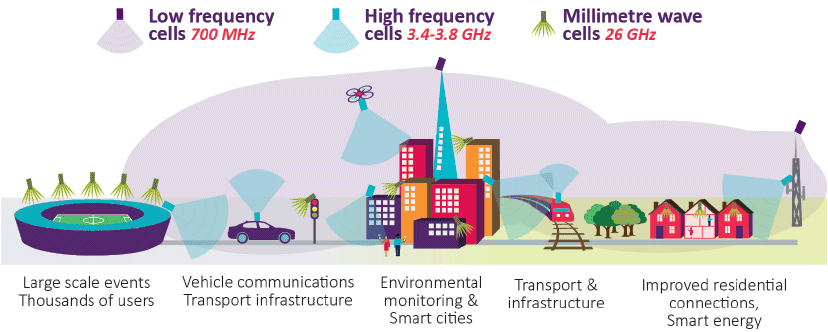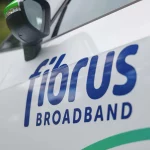Government Name Six UK Winners of £25m for 5G Mobile Trials
The government’s Department for Digital, Culture, Media & Sport (DCMS) has today named six projects that have won a slice of £25 million (public funding) to help trial the next generation of 5G based Mobile and fixed wireless broadband ISP technology at various locations across the United Kingdom.
The investment is specifically intended to support Phase One of the initial “testbeds and trials,” which are being setup to help develop the country’s “5G ecosystem” of the future. The funding stems from a 2016 commitment by the Government to invest £740 million from the National Productivity Investment Fund (NPIF) into digital infrastructure, which also aims to catalyse private investment in “full fibre” (FTTP/H) networks (here).
Margot James, UK Digital Minister, said:
“One year on from the Digital Strategy, we are delivering on our commitments to create a Britain fit for the future, with a thriving digital economy that works for everyone.
The ground-breaking projects announced today will help to unlock 5G and ensure the benefits of this new technology are felt across the economy and wider society.”
At the time of writing 5G has yet to finalise all of its official standards and is still very much in the R&D phase, although a number of UK field trials are already taking place (e.g. Vodafone + EE are testing 3.5GHz and then there’s Aqiva’s London trial via the 28GHz millimetre wave band). Some of the trials have already recorded data speeds of several Gigabits per second (Gbps) and the IMT-2020 specification supports up to 20Gbps.
Advertisement
In terms of spectrum use, Ofcom expects that the 700MHz band will prove useful for cheaply delivering wide 5G Mobile coverage in rural areas. Meanwhile the bands around 3-6GHz will focus more on urban areas (limited range will confine their use to areas of high demand) and of course the very high frequencies above 24GHz (e.g. millimetre Wave) should support “very large bandwidths, providing ultra-high capacity and very low latency” (i.e. fixed wireless links to homes or businesses etc.).

Apparently each testbed being announced today will receive between £2m and £5m in government grants, as part of a total investment of £41m from private sector and other public sector funding, to explore new 5G mobile communications technologies.
The Six 5G UK Trials and Testbed Projects
5G RuralFirst: Rural Coverage and Dynamic Spectrum Access Testbed and Trial
Lead organisation: Cisco
Grant: £4.3m
5G RuralFirst, led by Cisco and lead partner University of Strathclyde, will deliver testbeds and trials to exploit 5G benefits for rural communities and industries like agriculture, broadcasting, and utilities, to address the challenges of and build the business case for 5G rural deployment.
Based primarily on the Orkney Islands, and in the farmlands of Shropshire and Somerset, the project will integrate spectrum sharing strategies for 5G; bringing connectivity to rural communities, enabling smart farming in partnership with Agri-Epi Centre (including drones, autonomous farm vehicles and remote veterinary inspections); innovative methods of delivering broadcast radio over 5G working with the BBC, alongside the delivery of 5G connectivity for IoT in utility and other industries in rural areas.
5G Smart Tourism
Lead organisation: West of England Combined Authority
Grant: £5.0m
This testbed will focus on delivering enhanced visual experiences for tourists using Augmented Reality (AR) and Virtual Reality (VR) technology in major attractions in Bath and Bristol, including the Roman Baths and Millennium Square. Content and technology developments will be provided by the BBC and Aardman with support from the University of Bristol’s Smart Internet Lab. It will demonstrate self-provision of 5G and Wi-Fi and innovative mmWave backhaul, and will also address safety issues by providing emergency service capacity through network splicing.
Worcestershire 5G Consortium – Testbed and Trials
Lead organisation: Worcestershire County Council
Grant: £4.8m
A team of 5G and Industry 4.0 experts lead this project – working with Worcestershire LEP, the consortium comprises: Worcestershire County Council, 5GIC at University of Surrey, AWTG, Huawei, O2, BT and Malvern Hills Science Park. With local businesses Worcester Bosch, and Yamazaki Mazak it will focus on ways to increase industrial productivity through preventative and assisted maintenance using robotics, big data analytics and AR over 5G.
It will also have a cyber security aspect, with QinetiQ providing assurances on the ‘security by design’ of 5G and IoT technology. Entrepreneurs will have the opportunity to test 5G capabilities in a new commercial tech accelerator located at the Malvern Hills Science Park.
Liverpool 5G Testbed
Lead organisation: Sensor City
Grant: £3.5m
Sensor City will lead a consortium made up of public sector health suppliers, the NHS, university researchers, local SMEs and a leading UK 5G technology vendor. Funded for one year in the first instance, the project will see high value technologies including low-cost open source 5G networks, artificial intelligence, virtual reality and IoT deployed across deprived communities in the Liverpool City Region test bed. The consortium will use this technology to reduce the digital divide, while measuring the impact on patient monitoring and support, management of loneliness in older adults, aid to independents living in the home and the facilitation of communication between hospitals and the community.
AutoAir: 5G Testbed for Connected and Autonomous Vehicles
Lead organisation: Airspan Communications Ltd
Grant: £4.1m
AutoAir will aim to make 5G technologies available for the validation and development of Connected and Autonomous Vehicles (CAVs) at the UK’s premiere vehicle proving ground at Millbrook. Fast travel speeds complicate cell-tower handoff, and autonomous vehicles will require more network bandwidth than is available currently. It will also investigate how these 5G connectivity solutions could be transferable to both road and rail transportation.
The project is based on the accelerated development of 5G small cells operating in both licensed Sub 6 GHz and mmWave bands on a shared ‘neutral host’ platform which allows multiple public and private 5G operators to simultaneously use the same infrastructure using network slicing.
5G Rural Integrated Testbed (5GRIT)
Lead organisation: Quickline Communications
Grant: £2.1m
5GRIT will be trialling innovative use of 5G technology across a range of rural applications, such as smart agriculture, tourism and connecting poorly-served communities, using shared spectrum in the TV bands and a mix of local ISPs and self-provision.
The aim is to ultimately make high quality connectivity available across Cumbria, Northumberland, North Yorkshire, Lincolnshire, Inverness-shire, Perthshire and Monmouthshire. Here the consortium will develop 5G-ready AR apps for tourists and investigate how high-bandwidth wireless connectivity can increase food production in farming, including through use of AR and an unmanned aerial system.
In terms of broadband connectivity we’re probably most interested to see how Quickline’s 5GRIT trial turns out because it seems to have a focus on expanding Fixed Wireless Access (FWA) style connectivity into rural parts of the UK. The mention of using TV spectrum (aka – TV White Spaces) is particularly interesting since we haven’t seen that done with a 5G technology before, although Microsoft have played around with it using LTE (4G).
Advertisement
The first commercial 5G Mobile and Fixed Wireless Broadband deployments are widely expected to start from 2020, which is roughly around when Ofcom hopes to have released all of the necessary radio spectrum bands for the initial service launches to use.
Mark is a professional technology writer, IT consultant and computer engineer from Dorset (England), he also founded ISPreview in 1999 and enjoys analysing the latest telecoms and broadband developments. Find me on X (Twitter), Mastodon, Facebook, BlueSky, Threads.net and Linkedin.
« Post Office Confirm UK Phone and Broadband Price Rises for 2018

















































Comments are closed